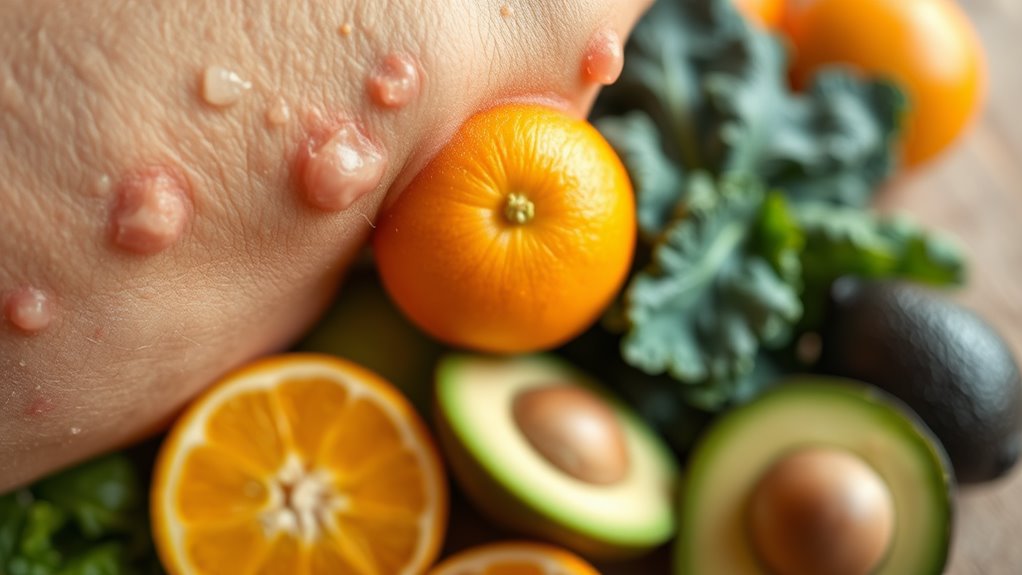5 Skin Conditions You Didn’t Know Could Be Related to Diet
You might not realize how much your diet impacts your skin health. Certain foods can trigger flare-ups or exacerbate existing conditions like acne, eczema, and psoriasis. If you’re struggling with skin issues, it could be time to reassess what’s on your plate. Curious about which specific foods might be affecting you? Let’s explore how these connections can play a significant role in your skin’s appearance and overall health.
Key Takeaways
- Acne: High sugar intake can trigger insulin spikes, increasing oil production and leading to breakouts.
- Eczema: Dairy products may cause inflammation and allergic reactions in some individuals, worsening skin irritation.
- Psoriasis: Processed foods and refined sugars can exacerbate inflammation, while anti-inflammatory foods can help manage symptoms.
- Rosacea: Spicy foods and alcohol, particularly red wine, can dilate blood vessels and increase facial redness.
- Hives: Common food allergens like nuts, shellfish, and dairy can lead to itching, swelling, and other skin reactions.
Acne: The Sugar Connection
When you consume sugary foods, you mightn’t realize the impact they can have on your skin, particularly when it comes to acne. High sugar intake can trigger insulin spikes, which in turn stimulate oil production in your skin.
This excess oil, combined with dead skin cells, can clog pores and lead to breakouts. Additionally, sugary diets can promote inflammation, exacerbating acne conditions. Incorporating effective skincare routines into your daily habits can also help manage oily skin.
If you’re serious about achieving clear skin, reassessing your diet is essential. Reducing sugar not only benefits your skin but also enhances overall health.
Opt for whole foods, rich in nutrients, that support skin health. By making mindful dietary choices, you can take significant steps toward mastering your skin’s health and reducing acne flare-ups effectively.
Eczema: Dairy and Its Role
Although dairy products are often staples in many diets, they can considerably impact individuals with eczema. If you struggle with this condition, it’s worth considering how dairy might be influencing your skin.
Research suggests that dairy can trigger inflammatory responses in some people, leading to flare-ups. The proteins found in cow’s milk, particularly casein and whey, may provoke allergic reactions or sensitivities, exacerbating your symptoms.
You might notice a correlation between your dairy intake and skin irritation. To gain mastery over your eczema management, consider an elimination diet, removing dairy for a few weeks to assess changes in your skin’s condition.
This approach can provide valuable insights into your specific triggers and help you make informed dietary choices.
Psoriasis: Inflammation and Food Triggers
Eczema and psoriasis share a common thread: both conditions can be influenced by inflammation and dietary choices.
If you struggle with psoriasis, it’s essential to recognize how certain foods might trigger flare-ups. Processed foods, refined sugars, and high-fat dairy can exacerbate inflammation, making your skin condition worse.
On the flip side, incorporating anti-inflammatory foods, like fatty fish rich in omega-3s, leafy greens, and nuts, can help soothe your skin. Staying hydrated and minimizing alcohol intake also plays a significant role in managing symptoms.
Rosacea: Spicy Foods and Alcohol
For those grappling with rosacea, understanding how certain foods can trigger symptoms is essential. Spicy foods, for instance, can dilate blood vessels and increase facial redness, exacerbating your condition. If you’ve noticed flare-ups after indulging in chili, pepper, or curry, it’s wise to limit these ingredients in your diet.
Similarly, alcohol, particularly red wine, can be a significant trigger. Its histamine content and ability to cause vasodilation can lead to increased flushing and irritation.
Monitoring your intake and recognizing patterns can empower you to manage your rosacea effectively. Consider keeping a food diary to pinpoint specific triggers.
Hives: Food Allergies and Sensitivities
When you experience hives, identifying potential food allergies and sensitivities is essential for finding relief. Foods like nuts, shellfish, and dairy often trigger these reactions. Keeping a food diary can help pinpoint specific culprits.
| Food Group | Common Triggers | Symptoms |
|---|---|---|
| Dairy | Milk, cheese, yogurt | Itching, swelling |
| Shellfish | Shrimp, crab, lobster | Red welts, burning |
| Nuts | Peanuts, almonds | Rash, difficulty breathing |
Frequently Asked Questions
Can Stress Also Impact Skin Conditions Related to Diet?
Absolutely, stress can greatly impact skin conditions. When you’re stressed, your body releases hormones that may exacerbate inflammation and disrupt your skin’s barrier, making existing issues worse and triggering new problems. Manage stress for healthier skin.
How Long Does It Take for Dietary Changes to Affect Skin?
It typically takes about four to six weeks for dietary changes to visibly affect your skin. During this time, your body adjusts, and you may notice improvements in texture, clarity, and overall health. Stay consistent!
Are There Specific Vitamins That Improve Skin Health?
Vitamins A, C, and E are essential for skin health. They promote cell regeneration, protect against damage, and support collagen production. Incorporating these vitamins into your diet can greatly enhance your skin’s appearance and resilience.
Can Hydration Levels Influence Skin Conditions?
Absolutely, your hydration levels greatly influence skin conditions. When you’re well-hydrated, your skin stays plump and elastic, helping reduce dryness and irritation. So, make sure you’re drinking enough water daily for ideal skin health.
Is It Possible for Skin Conditions to Improve With a Balanced Diet?
Yes, a balanced diet can greatly improve skin conditions. When you incorporate nutrient-rich foods, you fuel your body with essential vitamins and minerals, promoting healthier skin and reducing inflammation. It’s all about what you eat!

